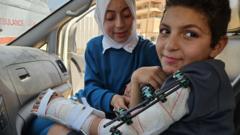After a year of severe shortages, Nigeria is set to receive vital drugs to treat leprosy, according to the World Health Organization. The country's new regulations on drug testing had interrupted supplies, leaving many patients without treatment. Health experts call for the urgent distribution of these medications to prevent further health deterioration and disease transmission.
Nigeria to Receive Essential Leprosy Treatment After Year-Long Shortage

Nigeria to Receive Essential Leprosy Treatment After Year-Long Shortage
The World Health Organization announces the arrival of crucial leprosy medications in Nigeria, easing the plight of affected individuals.
After a prolonged scarcity spanning a year, people afflicted with leprosy in Nigeria are anticipated to access essential medications this weekend. The World Health Organization (WHO) confirmed that much-needed drugs will arrive from India, remedying the crisis that affected thousands of patients.
Nigeria, which annually reports over 2,000 new leprosy cases, faced a significant disruption in its drug supply chain due to newly imposed testing regulations aimed at combating counterfeit and substandard medicines. These regulations inadvertently affected the availability of vital leprosy treatments, leading to hospital patients being sent home without care.
Public health expert Dr. Samimu Msheliza of the Nigerian Leprosy Mission underscored the urgent need for these medications. “Thousands of newly diagnosed leprosy patients across various cities are currently in desperate need,” he noted. “The delay in treatment exacerbates their suffering and increases the risk of disease transmission.”
One patient, Awwal Musa, recounted her deteriorating condition, stating that her wounds worsened significantly due to the absence of the necessary drug combination. “Before last year, my wounds were getting healed but now they are getting worse. The pain is worse,” she lamented, illustrating the severe impact of the medication shortage.
The Nigerian drug authority's new regulations aim to ensure medicine safety after several medications faced recalls for not meeting established safety standards. However, the repercussions of these regulations have delayed crucial treatments, including those for leprosy.
The WHO has urged Nigeria to temporarily lift its testing policy to expedite the delivery of these essential medications. With the drugs finally en route, it is hoped that treatment of leprosy will resume, providing much-needed relief to affected individuals.




















